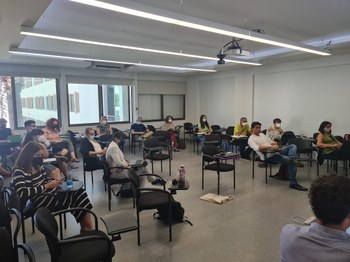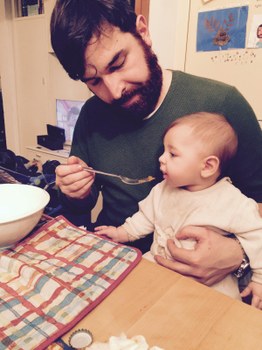NeMo 2019-1-IT02-KA201-063340

NeMo Joint Staff Training Event | 27 - 30 September 2021 | Nicosia (CY)
The 4-days training was held in Nicosia (CY) in September 2021 As described in detail over the call for extension sent to and approved by the National Agency, due to Covid-19 situation, the related mutual flights’ bans among EU countries and the local restrictions in Cyprus, the Joint Staff Training Even, formerly set on September 2020, has been postponed at the end of September 2021 thanks to the extension provided. The main general aim of the training was to equip all the participant organisations with the necessary knowledge and skills to:
- Acquire a methodology to observe the relationship between children and caregiver in order to drive pre-primary teachers in recognising potential alarming signs of neuro-developmental disorders over the local pilots and test the digital version of the IO1 tool. - Acquire knowledge and skills to drive pre-primary teachers over local pilots in the usage of VIVO app and EDUTEA digital questionnaire in order to include ICT skills in pre-primary learning deployment. The specific goal of this activity was to allow participants to gain the technical competences and information to deliver the Pre-linguistic phase observation methodologies and the ICT tools for ASD children into local ECEC centres (O1_A3; O3_A2).
The main content-providers of the training (University of Bologna, University of Valencia and AIAS) prepared a work-plan for the 4-days training in order to equip partner organisations staffs with all the necessary information, materials and practical skills to transfer the innovative methodologies and
tools belonging to IO1 and IO3 addressing local ECEC teachers over the pilots. About the first Output, the training provided a first introduction of typical and atypical interaction features between children and caregivers during the secondary intersubjectivity (9-18 months), an overview of the main areas of monitoring deployed by the official screening test, a study on interactions in space, narrative features and further features related to disability in order to not overlap with ASD. The training provided space for a practical observation methodology with all the participants by exploiting some of the video collected through the NEMO platform. The first collective simulations have been repeated in small semi-autonomous groups in order to get participants familiar with the brand new methodology.
The NeMo Manual has been delivered to participants to follow the methodology step-by-step. After the first ten simulations, the digital version of the tool has been delivered and tested in groups. Concerning IO3, a first introduction on research findings and survey outcomes has been followed by a practical demonstration on how to use the apps to monitor the toddlers and detect early signs of ASD. Even in this case paper materials and instructions have been delivered to participants and later transferred to local pre-primary teachers for the success of the local pilots. Activities in VIVO have been structured and deployed in form of task analysis in order to let participants use ICT tools for preparing learning multistep activities in preprimary
centers even with people with ASD.
Over the training some extra development was implemented to improve usability and user experience for the NeMo target group. The resulting app is a forked version of the original VIVO. The EDUTEA questionnaire is a multi-language teacher-reported questionnaire to screen for early signs of ASD. The questionnaire has been deployed and explained to trainees in order to be transferred in local ECEC settings over the pilots. The training involved all experts, teachers and researchers from each participating organisation. All the participants received the an attendance certificates and their feedbacks and evaluation collected through related questionnaire. Participants gained the following learning outcomes as final results of the training:
- acquire new observation methodologies to assess children developments;
- improve narrative assessment methods;
- define special educational needs;
- identify children with special educational needs;
- support parents of children with ASD;
- Design prototype monitoring and learning curriculum using off-the shelf ICT devices and interface software which addresses a range of cognitive abilities and transferable skills, making use of the prototype pedagogy employing ICT;
- Implement a structure and reliable
ICT-based procedure to assist pre-primary teachers in delivering multi-tasks sessions.
- Pilot test of the NEMO pedagogy within target group in the partners’ countries.


The European Commission's support for the production of this publication does not constitute an endorsement of the contents, which reflect the views only of the authors, and the Commission cannot be held responsible for any use which may be made of the information contained therein.